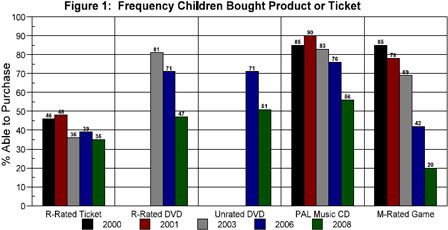- Qualcomm Launches Snapdragon 4 Gen 2 Mobile Platform
- AMD Launches Ryzen PRO 7000 Series Mobile & Desktop Platform
- Intel Launches Sleek Single-Slot Arc Pro A60 Workstation Graphics Card
- NVIDIA Announces Latest Ada Lovelace Additions: GeForce RTX 4060 Ti & RTX 4060
- Maxon Redshift With AMD Radeon GPU Rendering Support Now Available
M-rated Videogame Sales to Minors on a Steep Decline
Anti-videogame renegades share one common trait. They love to point the blame at the retailer for putting M-rated games in the hands of children, and for the most part, I agree that kids shouldn’t be playing some of the games on the market today. However, what’s striking is the fact that many kids have far better luck getting a hold of an R-rated movie, or an explicit CD.
In some regards, I believe movies would be far more impressionable than a video game. You might have control of a game, but movies are real. When I was a kid, I used to jump around the house as a ninja… because of movies. I don’t remember climbing up a tree after playing Donkey Kong Country or ripping a friends heart out because of Mortal Kombat.
Regardless of all that, the good news is that M-rated game sales to minors is on a steady decline, so it’s now difficult for the likes of Jack Thompson to make an argument about it. According to the FTC’s undercover work, only 20% of sales occurred to minors with M-rated games. Compare that to the 35% who were able to get into an R-rated movie, 51% who could purchase an unrated DVD and 54% who had no issue picking up an explicit CD.
The fact is, these other markets could take a lesson from videogame sale practises, not vice versa. Surprisingly, GameStop proved to be highest-ranked store for not selling to minors, with only 6% making it out the door. By comparison, Best Buy, Target and Barnes & Noble all sold M-rated games to minors 60%+ of the time.

|
The survey found that results of the undercover shopping varied by retailer and product. Three movie chains – National Entertainment, Regal Entertainment Group, and American Multi-Cinema – turned away 80% or more of the underage teens who tried to buy a ticket to an R-rated movie. Wal-Mart did the best of the major retailers shopped for movie DVDs, denying sales of R-rated and Unrated DVDs to 75% of the child shoppers.
Source: Federal Trade Commission Report, Via: GamePolitics




